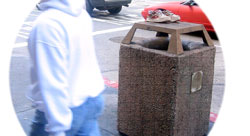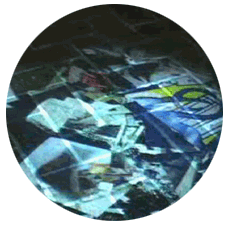|
|
|
|
|
|
|
|
|
|
|
|
||||||||
 |
|
|
||||||
|
|
||||||||
|
|
|
|
||||||
|
|
||||||||
|
|
||||||||
 |
|
|
||||||
|
|
|
|
||||||
|
|
||||||||

|

|
||||||||||||||||||||||||||||||||||||||||||||||||||||||||||
|
|
||||||||||||||
|
|
|
|
|
|
|
|
|
|
|
|
|
|
|
|
|
|
|
|
|
|
|
|
||||||||
|
INFO |
|
KEY POINTS |
|
|
Urban trash is often seen primarily as an issue of
However...urban trash also exposes a larger social urban context such as the
|
|
|
ARCHAEOLOGY OF PUBLIC URBAN TRASH |
|
|
The management and export of trash from urban centers has become big business, the last piece in a journey through conception, design, production, distribution, retail and consumption that finds focus in the city as a facilitator of commercial exchange and shear scale. Often ignored or regarded as disgusting, our urban trash reveals fascinatingly rich details of urban life. Archaeologists have long known that amazingly detailed images of life within an ancient civilization can be revealed by examining its trash. Trash is truth. While Americans report their “real” dietary patterns in surveys and interviews, the truth is actually revealed by examining the rubbish they leave behind. The Garbology Project in the Anthropology Department at the University of Arizona has been measuring urban trends over the past 30 years by excavating and evaluating over 150 tons of trash across American cities. |
|
|
TRASH AND TECHNOLOGY |
|
|
First introduced 30 years ago, the Universal Product Code (UPC) more commonly known as the barcode has become ubiquitous on product labeling and packaging and therefore on trash. More recently, inexpensive RFID technologies, used primarily for inventory tracking during production and shipment, are poised to be incorporated into nearly every consumer product. In fact the most ubiquitous American retail outlet, Wal-Mart as well as the largest distribution entity in the United States, the Department of Defense, have both mandated RFID compliance within the next few years. What opportunities arise as we examine such attached technology moving through the final stage of a product lifecycle – from product consumption to trash? RFID trashcan readers? Automated trash sorting? New visualizations of trash movement throughout a city? More importantly how will the heated public debate over RFID technologies and privacy play out in this space? |
|
OUR PROBE |
|
Our Urban Probe explores these themes and reveals the authentic life of a small urban microcosm centered around a small public artifact – a mundane, yet active public trashcan. This satisfies one of the previously discussed Urban Probes goals of exposing an unknown or provocative element of a city landscape. |
|
Urban Atmospheres at Intel Research |